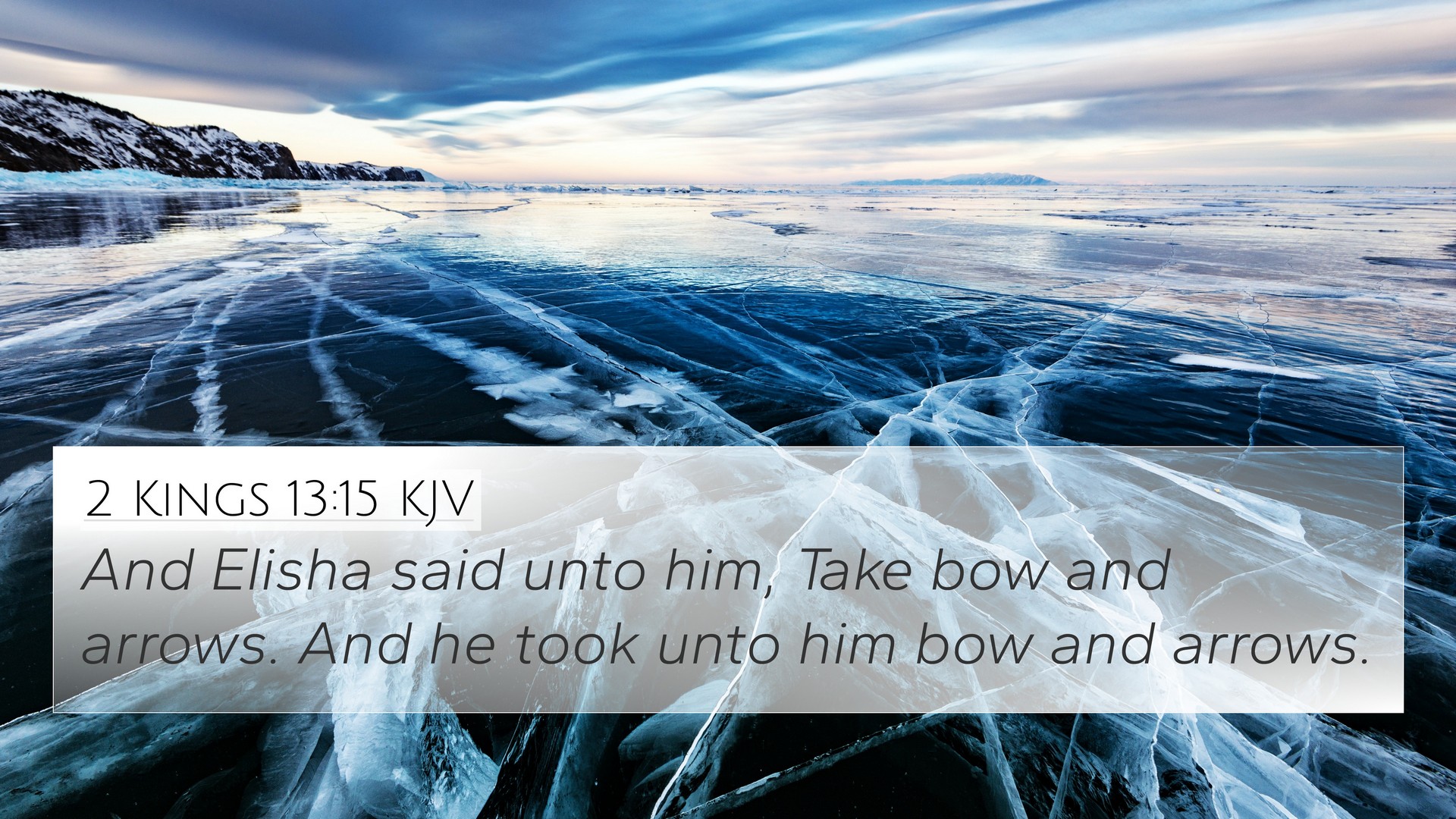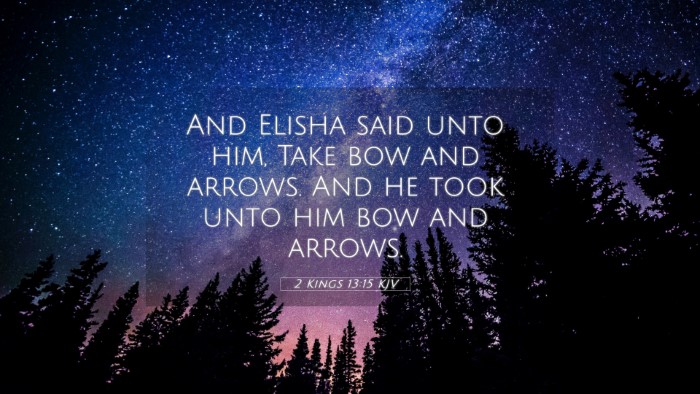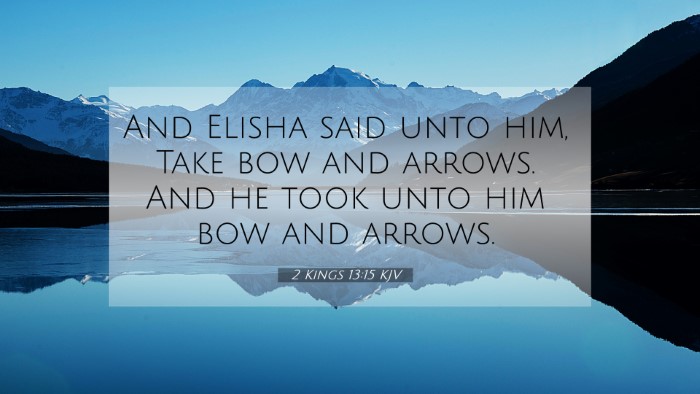Understanding 2 Kings 13:15
Verse: "And Elisha said unto him, Take bow and arrows. And he took unto him a bow and arrows." (2 Kings 13:15, KJV)
Summary of the Verse Meaning
This verse comes from a significant moment in the life of Elisha, the prophet, as he interacts with King Joash of Israel. Here, Elisha instructs Joash to take up bow and arrows, which serves as a preparation for a prophetic act that symbolizes Israel's military strength and God's promise to deliver them from their enemies.
Interpretation Insights
Public domain commentaries provide valuable insights into this verse:
-
Matthew Henry's Commentary:
Henry emphasizes the prophetic symbolism in Elisha's instructions. The act of taking up the bow and arrows signifies the need for spiritual and physical readiness as Israelites faced the realities of warfare. It illustrates God’s involvement in Israel's victories, urging the king to acknowledge that success comes from divine guidance.
-
Albert Barnes' Notes:
Barnes elaborates on the significance of the bow as a tool for battle, indicating that Joash's action signifies the necessity of preparation and trust in God’s power. The arrows are viewed as instruments of war, symbolizing that while the king must act, victory ultimately rests in God’s hands.
-
Adam Clarke's Commentary:
Clarke focuses on the practical implications of Elisha's command, highlighting the importance of obedience in spiritual matters. By calling for the bow and arrows, Elisha conveys a message of action, encouraging Joash to participate actively in the unfolding of God’s promises through faith and preparedness.
Cross References and Connections
This verse stands in relation to several other key Biblical texts, illustrating core themes of faith, obedience, divine intervention, and the preparation for battle against adversaries. Consider the following cross-references:
- 2 Kings 13:16: Elisha signifies God's intention for victory, calling Joash to shoot an arrow, which reflects a divine promise.
- 1 Chronicles 5:22: This verse similarly speaks to Israel’s conflicts and God’s protective presence within them, forming thematic links.
- Psalms 44:3: Here, the Psalmist recognizes that victory is not derived from military might but through God's favor.
- Isaiah 54:17: This verse reminds the faithful that no weapon formed against them shall prosper, reinforcing reliance on God for victory.
- Ephesians 6:17: Paul discusses the armor of God, aligning with the motif of weapons representing divine protection and preparation for spiritual warfare.
- Romans 8:37: This assurance that believers are more than conquerors through Christ strengthens the connection between divine help and human action.
- Acts 20:32: This speaks of the Word of God being able to build believers up and provide their inheritance, indicating the importance of spiritual preparation.
- Exodus 14:14: Reiterates that the Lord fights for His people, emphasizing reliance on divine intervention during battles.
- Hebrews 11:32-34: The heroes of faith are noted for their victories, linking Joash's actions to the faith of those who came before him.
- 2 Corinthians 10:4: Paul's assertion that the weapons of our warfare are not carnal aligns the theme of spiritual preparation for battle.
Thematic Connections
The verse connects with broader Biblical themes of obedience, the necessity of divine support in conflict, and the preparedness required for God's intervention. This narrative in 2 Kings can be explored through various methods:
- Inter-Biblical Dialogue: Understanding how the narratives of the Old Testament influence New Testament beliefs and practices.
- Comprehensive Bible Cross-Reference Materials: Utilizing tools like a Bible concordance to track key themes and their development throughout scripture.
- The Bible Cross-Reference Guide: A useful resource for identifying parallels and contrasts within the text, leading to deeper understanding.
- Cross-Referencing Bible Study Methods: Approaching study with the intention of uncovering thematic relationships between texts.
Application of Insights
This verse invites believers to reflect on their own readiness and faith in God's promises. Just as King Joash was challenged to take physical action, modern-day followers are called to prepare spiritually for the challenges they face, with the assurance that God is actively involved in their struggles.
Conclusion
2 Kings 13:15 serves as a vivid reminder of the intersection between human action and divine influence. Through the prophetic act commanded by Elisha, we learn the importance of preparation, faith, and the assurance of God's help in our endeavors. By tracing cross-references and thematic connections, one can deepen their understanding of the text and its implications for contemporary faith and practice.
Reflection Questions
Consider the following questions for personal application or group discussion:
- How are you preparing yourself spiritually for the challenges ahead?
- In what ways do you see God’s assistance in your life’s battles?
- What actions are required from you as part of your faith journey?


